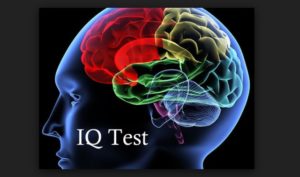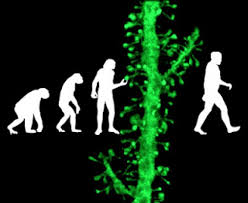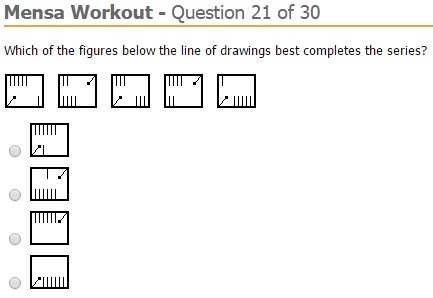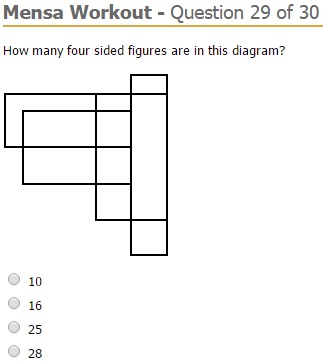 Ever taken an IQ test? If you did, you probably marked around 100. That’s the average where over 80 percent of all people fall in. Maybe you scored higher—say 140. That’d put you in the top 2 percent where Mensa members like Stephen Hawking resided. Or, you could be down in the 80s which some consider slow. But don’t feel bad if you’re sub-100 because Steve Jobs got an 86 and he made out just fine.
Ever taken an IQ test? If you did, you probably marked around 100. That’s the average where over 80 percent of all people fall in. Maybe you scored higher—say 140. That’d put you in the top 2 percent where Mensa members like Stephen Hawking resided. Or, you could be down in the 80s which some consider slow. But don’t feel bad if you’re sub-100 because Steve Jobs got an 86 and he made out just fine.
IQ stands for Intelligence Quotient. That’s an arbitrary scale where mental cognitive functions are examined and given a numeric value. How valid is it? Well, there are divided opinions on IQ meanings. Some brilliant savants need velcro for shoelaces while Muhammad Ali, who scaled 76, handed out exceptional jabs of wisdom never mind dealing knock-out blow interviews.
 If you’ve never taken an IQ test, here’s your chance to do one online. There are lots of sites available. Some are credible. Some are not. One belongs to Mensa and that worldwide organization for the gifted is considered the leading authority for rating and linking people with exceptionally high IQs. Their acceptance mark is 132. It has to be verified under proctored conditions. But, then, Mensa membership has its perks.
If you’ve never taken an IQ test, here’s your chance to do one online. There are lots of sites available. Some are credible. Some are not. One belongs to Mensa and that worldwide organization for the gifted is considered the leading authority for rating and linking people with exceptionally high IQs. Their acceptance mark is 132. It has to be verified under proctored conditions. But, then, Mensa membership has its perks.
Can you make the Mensa club? You just might. But, first, let’s look at what science says about intelligence, where it comes from and where it’s going—especially artificial intelligence or AI. We’ll see how intelligence is classified as well as investigate human traits more important than book smarts. It’s interesting to know some famous people’s IQs and who are the top 5 of all time. We’ll sample a Mensa exam and give you the opportunity to test drive one. Then we’ll check how I made out qualifying for Mensa.
 True intelligence is tough to define. It’s subjective and objective at the same time. That makes defining intelligence controversial. Possibly the best analogy comes from Albert Einstein who said, “The true sign of intelligence is not knowledge but imagination.” Einstein never took an IQ test and he’s estimated to have ranked pretty high mentally. Practicality was a different story. He theorized relativity and the space-time continuum but couldn’t balance his checkbook. Socrates also had a go at defining intelligence. “I know that I am intelligent because I know nothing,” the great philosopher said. Then Socrates dismissed the brain as being part of the body’s cooling system and concluded intelligence came from the heart.
True intelligence is tough to define. It’s subjective and objective at the same time. That makes defining intelligence controversial. Possibly the best analogy comes from Albert Einstein who said, “The true sign of intelligence is not knowledge but imagination.” Einstein never took an IQ test and he’s estimated to have ranked pretty high mentally. Practicality was a different story. He theorized relativity and the space-time continuum but couldn’t balance his checkbook. Socrates also had a go at defining intelligence. “I know that I am intelligent because I know nothing,” the great philosopher said. Then Socrates dismissed the brain as being part of the body’s cooling system and concluded intelligence came from the heart.
The word “intelligence” comes from the Latin verb “intelligere” which means to comprehend or perceive. This developed into the Greek “intellectus” or “understanding” and the phrase “intellectus intelligit” that translates to “understanding understanding”. This play-on-words describes a general mental capacity involving the ability to reason, plan, solve problems, think in abstract, comprehend complex ideas, communicate and learn from experience. It’s more than book learning, academic skill or test-taking smarts. Intelligence is the ability to make sense of things, catch on quick and figure out what to do.
There are many theories of intelligence. They come from scientific disciplines like neurology and psychiatry. They flow from philosophers and learned scholars in education. Even religious groups take a crack at rating intelligence. Regardless of where opinions come from, two main forms of human intelligence are universally recognized.
- Crystallized intelligence encompasses factual knowledge gained through education and life experiences.
- Fluid intelligence is the ability to process information, make logical decisions and inhibit irrational emotional impulses.
Two main theories around intelligence are attributed to Howard Gardner and Robert Sternberg. Gardner, a Harvard professor, itemized seven specific components of intelligence—musical, bodily-kinesthetic, logical-mathematical, linguistic, spatial, interpersonal and intrapersonal. The idea behind his theory explains why some people are better than others at skills like numbers, words and relationships. Sternberg disagreed. He broke intelligence into three groups—analytical, creative and practical. Those are abilities to solve problems, deal with new situations and adapt to changing environments.
 Charles Spearman hypothesized that one factor generally framed intelligence. He called it the “g-factor” and postulated all people are basically the same—only some are better at things than others. I’m not sure I follow that simple reasoning and tend to agree with mainstream theories of intelligence being divided into distinct categories. It seems some people are clearly at ease with particular intellectual domains and there’s no single factor explaining performance across a wide range of intelligent abilities.
Charles Spearman hypothesized that one factor generally framed intelligence. He called it the “g-factor” and postulated all people are basically the same—only some are better at things than others. I’m not sure I follow that simple reasoning and tend to agree with mainstream theories of intelligence being divided into distinct categories. It seems some people are clearly at ease with particular intellectual domains and there’s no single factor explaining performance across a wide range of intelligent abilities.
Anatomy and neuroscience have taken a good, hard look at what constitutes intelligence. They see it developing as electro-chemical signals being transported through interconnected neuron circuits. Basic brain structure monitored by functional magnetic resonance imaging (fMRI) shows most “intelligent” interactions occur in the frontal or parietal region and are centered in the anterior cingulate cortex. This is called the Parietal-Frontal Integration (PTI) theory and it’s supported by scientific evidence.
There’s one problem with the PTI theory. It can’t account for consciousness. Without consciousness, there’s no intelligent operation in the brain and science doesn’t have the remotest grasp on the nature or origin of consciousness. Consciousness is suspected to be the Grand Unified Theory (GUT) that unites the basic known physical properties of space-time and energy-mass into one single explanation of the universe. At the center of the GUT is the source of intelligent consciousness and God only knows where that came from. But that’s another discussion.
Over centuries, educators recognized various students have various cognitive abilities. At the turn of the nineteenth/twentieth centuries, German psychologist Wilhelm Stern was tasked by a government public school commission to devise a way for detecting children with significantly below-average intelligence and mental retardation. The idea was to economically group these kids into Special-Ed classes rather than lock them inside expensive asylums.
 In 1905, Alfred Binet developed a scoring system for the intelligent quotient Stern was looking for. Binet used a ratio of mental ability to chronological age and based it on a point system with 100 being average. Anything below 100 was classified in retarded degrees and anything above was considered advanced. It was like ignition timing on an internal combustion engine. Lewis Terman at Stanford University in the United States realized Binet was on to something so Terman fine-tuned the IQ test into what’s known as the Stanford-Binet Intelligence Scale. It’s still in use today as the industry standard.
In 1905, Alfred Binet developed a scoring system for the intelligent quotient Stern was looking for. Binet used a ratio of mental ability to chronological age and based it on a point system with 100 being average. Anything below 100 was classified in retarded degrees and anything above was considered advanced. It was like ignition timing on an internal combustion engine. Lewis Terman at Stanford University in the United States realized Binet was on to something so Terman fine-tuned the IQ test into what’s known as the Stanford-Binet Intelligence Scale. It’s still in use today as the industry standard.
The Stanford-Binet 5th Edition IQ Range Classification goes like this:
- 160+ — Brilliant
- 145-159 — Very gifted or highly advanced
- 130-144 — Gifted or advanced
- 120-129 — Superior
- 110-119 — High average
- 90-109 — Average
- 80-89 — Low average
- 70-79 — Borderline impaired or delayed
- 55-69 — Mildly impaired or delayed
- 40-54 — Moderately impaired or delayed
- 39- — Not classified
When the Stanford-Binet IQ Test was first used, there were official classifications for people who scored low. The terms “moron”, “imbicile” and “idiot” were dropped in recent years out of correctness but we all know buzz words for smart and dumb people. Today, “switched-on” and “switched-off” are part of the Urban Dictionary. So are “privileged”, “backward”, “enlightened”, “dimly-lit”, “high-brow” and “half-wit”. We’re not allowed to say “retard” like I was teased as a kid. It’s now replaced with “mentally-challenged” which I’m not. My mother had me tested.
 So the logical question is, “How did human intelligence develop to the point I’m at today?” Anthropologists agree homo sapiens jumped down from the primate tree around 2 million years ago and made a huge mental leap forward when they learned to cook food. That took intelligence in harnessing fire just as it took intelligence to invent simple machines like the wheel and axle, the screw, the pulley and the inclined plane. Despite what creationists say about evolution, the evidence is empirical that our brains progressively evolved over hundreds of thousands of years to expand a field called intelligence. Genetics, diet and social interaction played a big part.
So the logical question is, “How did human intelligence develop to the point I’m at today?” Anthropologists agree homo sapiens jumped down from the primate tree around 2 million years ago and made a huge mental leap forward when they learned to cook food. That took intelligence in harnessing fire just as it took intelligence to invent simple machines like the wheel and axle, the screw, the pulley and the inclined plane. Despite what creationists say about evolution, the evidence is empirical that our brains progressively evolved over hundreds of thousands of years to expand a field called intelligence. Genetics, diet and social interaction played a big part.
Discoveries and inventions made life easier. They gave humans more time to refine arts, literature and sport. Devices evolved into complex machines like smart cars and computerized guidance. Our evolution has arrived at the point where intelligent machines are in daily use and moving forward fast. We’re at the threshold of implementing Practopoiesis. That’s the conceptual bridge between biology and artificial intelligence. AI is here and it’s a matter of time before computerized brain implants are real.
That might be good and that might be bad for the human species. We’ve always struggled between haves and have-nots. Social advancement intrinsically links to out-thinking a competitor but societies have a way of balancing fairness in weak vs. strong. We’re able to see a line between naturally knowing and not being able to know.
It’s important to know IQ testing is not meant to identify character or personality traits. It’s strictly a ranking of intelligence to form a baseline for comparison. But the Stanford-Binet equation is recognized as a valid and useful measure for psychological and legal purposes. It forms part of a criminal defense strategy to establish mental culpability and the United States Supreme Court established anyone with a score of 70 or less is exempt from the death penalty.
 Before we look at how your IQ Test is structured and where you’ll mark, let’s see who’s been tested and how they rated. Many famous and infamous people have their IQs recorded and psychologists have speculated about where historical figures stood. We’ll break the categories down into science/invention, politics/military and arts/entertainment.
Before we look at how your IQ Test is structured and where you’ll mark, let’s see who’s been tested and how they rated. Many famous and infamous people have their IQs recorded and psychologists have speculated about where historical figures stood. We’ll break the categories down into science/invention, politics/military and arts/entertainment.
Science/Invention
- Albert Einstein — Swiss physicist — 160
- Albrecht von Haller — Swiss medical scientist — 190
- Benjamin Franklin — American inventor — 160
- Bill Gates — American inventor/businessman — 160
- Blaise Pascal— French philosopher — 195
- Charles Darwin — English botanist — 165
- Edith Stern — American computer engineer — 198
- Francis Crick — British discoverer of DNA — 134
- Henry Ford — American automaker — 125
- Immanuel Kant — German philosopher — 175
- Isaac Newton — English scientist — 190
- Leonardo da Vinci — Italian inventor/artist — 190
- Marie Curie — French chemist — 185
- Paul Allen — Microsoft co-founder — 168
- Ruth Lawrence — British Mathematician — 175
- Stephen Hawking — British theoretical physicist — 160
Politics/Military
- Abraham Lincoln — US President — 140
- Adolf Hitler — Nazi leader — 141
- Andrew Jackson — US President — 120
- Angela Merkel — German Chancellor — 136
- Benjamin Netanyahu — Israeli Prime Minister — 182
- Bill Clinton — US President — 137
- Barak Obama — US President — 130
- Boris Johnson — British politician — 79
- Donald Trump — US President — 156
- George Armstrong Custer — US Cavalry leader — 80
- George W. Bush — US President — 125
- George S. Patton — American WW2 general — 151
- Hillary Clinton — American politician — 143
- John F. Kennedy — US President — 117
- Margaret Thatcher — British Prime Minister — 176
- Ronald Raegan — US President — 103
- Ulysses S. Grant — US Civil War general/US President — 110
- Vladimir Putin — Russian President — 130
Arts/Entertainment
- Andy Warhol — American painter — 86
- Arnold Schwarzenegger — American actor/politician — 135
- Asia Carrera — International adult film star — 156
- Bobby Fischer — American chess master — 187
- Brittany Spears — American singer — 104
- Charles Dickens — British writer — 180
- Cindy Crawford — American model — 154
- Conan O’Brien — American television host — 160
- Geena Davis — American actor — 140
- James Woods — American actor — 180
- Jodie Foster — American actor — 132
- John Travolta — American actor — 90
- Lisa Kudrow —American actor — 161
- Madonna — British entertainer — 141
- Mayim Bialik — “Amy Farrah-Fowler” on Big Bang Theory — 163
- Nicole Kidman — Australian actor — 132
- Paris Hilton — American celebrity — 120
- Quinton Tarantino — American movie director — 165
- Robin Williams — American actor/comic — 142
- Rowan Atkinson (Mr. Bean) — British actor — 178
- Tina Fey — American entertainer — 143
- Tom Cruise — American actor — 94
- Vincent van Gogh — Dutch painter — 150+
That’s a pretty diverse and well-known crowd but they’re not the smartest— at least not as recorded IQ goes. That mark of distinction goes to these five.
- Marilyn vos Savant holds the Guinness Book of Records as the smartest woman alive. She’s best known for her high score but is an accomplished author and advice columnist. Ms. vos Savant repeatedly broke the 200 mark in IQ tests.
- Kim Ung-Yong is a Korean child prodigy. By the time he was three, Kim was fluent in five languages and could read and write all. He became a NASA engineer but returned home where he quietly teaches university classes. Kim has an IQ of 210.
- Christopher Hirata is an astrophysicist at the California Institute of Technology where he began professing at 14. He won the Physics Olympiad gold medal at 13 and scored 225 on his IQ exam.
- Terrance Tao is a Chinese genius who teaches advanced mathematics at the University of California. He’s won every math prize there is. It’s probably due to his IQ being 232.
- William James Sidis is no longer alive but has the distinction of the highest human IQ score ever recorded. There are discrepancies in test methods but it’s generally accepted he pushed close to 300. Sidis was an oddball and actually quite unstable. He attended Harvard at age 11 as a math student and went on to learn over 40 languages. His political activism got Sidis jailed and he died young. It was a cerebral aneurysm. Literally, his brain exploded.
These smart folks come from diversified backgrounds and have equally diverse personalities. They’re different, yet alike. Psychologists have found six characteristics that high-functioning people have in common, regardless of their IQ level.
- They’re highly adaptable
- They know what they don’t know
- They’re intensely curious
- They ask good questions
- They’re sensitive to other people
- They’re open-minded and critical of their own work
So that’s a wrap of how some scored on their IQ tests and how they operate. Now—how about yours? I’ve lined up a Mensa website where you can try your intelligence but, to practice, here are sample questions for helping you prepare.
Pear is to apple as potato is to?
- Banana
- Radish
- Strawberry
- Peach
- Lettuce
There are 1200 elephants in a herd. Some have pink and green stripes. Some are all pink. Some are all blue. One-third are all pure pink. Is it true that 400 elephants are definitely blue?
- Yes
- No
If it were two hours later, it would be half as long until midnight as it would be if it were an hour later. What time is it now?
- 18:30
- 20:00
- 21:00
- 22:00
- 23:30
What same three-letter word can be placed in front of these words to make a new word?
SIGN, DONE, FOUND, DENSE, FIRM, TRACT, DUCT
“If some Smaugs are Thors and some Thors are Thrains, then some Smaugs are definitely Thrains.” This statement is:
- True
- False
- Neither
The price of an article was cut 20% for a sale. By what percent must the item be increased to again sell it at the original price?
- 15%
- 20%
- 22 ½%
- 25%
- 30%
Which one of the five is least like the others?
- Ham
- Liver
- Salmon
- Pork
- Beef
If you count from 1 to 100, how many 7s will you pass on the way?
- 10
- 11
- 19
- 20
- 21
Sally likes 225 but not 224; she likes 900 but not 800; she likes 144 but not 145. Which does she like?
- 1600
- 1700
Jack is taller than Peter and Bill is shorter than Jack. Which of the following statements is the most accurate?
- Bill is taller than Peter
- Bill is shorter than Peter
- Bill is as tall as Peter
- It is impossible to tell
What is this word when unscrambled?
H C P R A A T E U
Which of the five designs is least like the other four?
- A
- Z
- F
- N
- E
Find the missing number:
0,1,1,2,3,5,8,13,—,34,55
John received $.41 in change from a purchase at the drugstore. If he received six coins, three of the coins had to be:
- Pennies
- Nickels
- Dimes
- Quarters
- Half-dollars
Only one other word in the English language can be made using all the letters from the word INSATIABLE. Can you find it?
If FP = 10 and HX = 16, what does DS = ?
What letter appears next in this sequence? B-V-C-X
Cattell III B has 158 questions. Cattell IV A has 317 questions. Which one is more difficult?
“A fish has a head 9” long. The tail is equal to the size of the head plus one-half the size of the body. The body is the same size as the head plus the tail.” How long is the fish?
- 27”
- 54”
- 63”
- 72”
- 81”
I tried 60 of these Mensa test questions and was allowed 20 minutes. After that, the process timed out. That’s 20 seconds per question. It doesn’t give much room for calculating, googling or phoning a friend. I’ll admit I guessed on some — especially the fish.
It’s not my first go-around on an IQ test but was my first try with Mensa. Back in high school, we were given IQ tests as some sort of socialist experiment. We were never shown scores so I don’t know my outcome. I was never a shining light in grade school but was smart enough to slide through by friending the smart kid.
 I sat beside Terry Blaney (we called him Terry Brainey) and I glanced across as Terry whizzed through our IQ test. I checked off what I saw him do then guessed the rest. My bet is Terry’s IQ hits 140 or better. He went on to get an engineering degree and I became a cop. I never kept in touch with Terry but you can’t hide on the internet. So I found him on Linked-In and see he retired as a VP with Shell Oil. Now Terry runs his private petroleum consulting business in Shanghai and I’m a wanna-be crime writer doing blog posts like this.
I sat beside Terry Blaney (we called him Terry Brainey) and I glanced across as Terry whizzed through our IQ test. I checked off what I saw him do then guessed the rest. My bet is Terry’s IQ hits 140 or better. He went on to get an engineering degree and I became a cop. I never kept in touch with Terry but you can’t hide on the internet. So I found him on Linked-In and see he retired as a VP with Shell Oil. Now Terry runs his private petroleum consulting business in Shanghai and I’m a wanna-be crime writer doing blog posts like this.
Which brings to my own intelligence and also to yours. Over the years, I’ve slid a lot further on bullshit than on gravel. And my experience firmly proves that bullshit baffles brains. But I know it’s hard to BS the computerized Mensa format so I gave it an honest go. Here’s the link if you’d like to try it: https://www.mensaiqtest.net/
I did the best I could with 60 questions within 20 minutes. Man, that was a challenge. Some were easy. Some took a pen & paper. Some were pure guess and some were gut feel. But all required an application of intelligence no matter how you approached. Then I hit the calculate button and got this:








Very interesting! And, of course, garnering a large response, quickly – who doesn’t like to think about their own abilities, importance, or uniqueness? While IQ tests have historically categorized everyone from students to job applicants, and unfairly even been used to differentiate races, more recently an EQ, emotional quotient, has been seen to have perhaps more importance. This can also be called maturity and “people skills”, as well as the ability to self-evaluate.
In my observation, two trends are apparent: 1) those with higher IQ’s can be depressed, isolated, and very awkward socially, and 2) people with a slightly above average IQ, but with a good EQ, are often the most successful and ‘popular’, both at work and in their personal lives.
Also, highly intelligent people usually see things realistically rather than idealistically. And if they are an idealist at heart, they may become cynical. Certainly those with low IQ can be unhappy as well, though often quite temporarily – a change of immediate circumstances can bring about a completely new outlook. All in all though, perhaps having above average intelligence is not very desirable.
As Garry writes about crime, I’d be interested in his assessment of whether criminals fall more into the high or the low IQ category – those caught and incarcerated, as well as the acquitted and the unknown subject. I suspect that few are truly “average people” (or have good EQ’s!).
Thanks for you intelligently thought out and well-articulated comment, Dan. I’m with you on the EQ importance. I don’t know if you’ve read “The EQ Edge – Emotional Intelligence and Your Success” https://www.amazon.com/EQ-Edge-Emotional-Intelligence-Success/dp/0470681616/ref=sr_1_4?keywords=EQ&qid=1561905884&s=books&sr=1-4 which does a great job of showing how IQ really isn’t important as long as you have strong people skills.
As for criminals and IQ – I’d say most are no smarter or dumber than anyone else on the IQ scale but many have excellent street smarts. Most of that comes from the school of hard knocks rather than being inherently born with it. Many criminologists debate the natured vs nurtured origin of criminal behavior but my experience is that most crooks are just anti-social assholes and I don’t really care at how they got that way. 🙂 Thanks again for your great comment!
Thank You, Garry (and I’ll check out that book), this was one of your most interesting, and comprehensive, articles yet! You can tell how much everyone really enjoyed it.
And thanks for the feedback, Dan. I did this piece a couple of years ago and thought it was time to re-share it. Over five years of blogging, I’ve tried to sense what my followers like to read. It seems two things are the most popular. One is analyzing famous crime cases like the JonBenet Ramsey murder. The other is pieces like this which makes people think about themselves. I’ll keep going till I get it right and it’s feedback from folks like you that encourage me to keep posting. Thanks!
Hello, Gary. An interesting article, indeed.
Years ago, I took a free IQ test and, I do believe, scored around 120.
After reading this and the comments, I ran a search for free IQ tests and went to a site called 123 tests dot com. On the classical variant, there are 10 questions and it gives 10 minutes to go through them. I got 7 of them correct and it said mine is somewhere between 105 and 120.
I’m not sure how this stacks up to MENSA but it definitely shows I’m not a complete idiot. Some evidence to the contrary.
Hi John – I have two acquaintances who are certified Mensa members and I think they paid to go to Mensa school or something. Seriously, they had to take an actual Mensa exam that was proctored and verified. They didn’t get anything for it except the exercise and the seat on the club bus which I think isn’t easy to get. I’d say most of us have a touch of idiot in us – I certainly do from time to time 🙂 Thanks for commenting!
Hi Gary,
Here’s another definition, revealed to me when starting college:
“The most reliable measure of intelligence, is the awareness of your own ignorance.”
Excellent quote, Mike. Fully agree 🙂 Thanks for sharing this!
Garry, thank you. This is so interesting. Somewhat like you I managed to survive my childhood grades, but by the skin of my teeth, so I did graduate grade and high school. I always felt ‘dumb’ in those days but did pretty well when I went out to work after high school. I do spend a lot of time on one side of my brain, which could have been the problem. You know–art, writing, reading, creating, day-dreaming and a great imagination. So here is the amazing thing. Now in my later years, I decided to go to the university for a BS in Criminal Justice Administration. I’m in my fourth year and still maintaining a 4.0 from day one. Here’s the catch. I have taken all of my criminal courses and psychology up front since my advisor is a dear and let me choose. I can not get enough of both courses, but next semester comes math, statistics, and about nine courses I really don’t want to take and know I will lose my 4.0 because I’m not interested in them, and math draws a blank. But at least I know there was a brain in there all this time. haha. I can’t even do the math samples here, except for one. Glad you are back–missed your blogs.
Wow, Gippy – 4.0! That’s impressive. I think our performance really excels when we’re genuinely interested in a subject. I’m all right brain, too – never could get into math other than using a calculator but what truly interests me is where the source of intelligence is. I don’t mean from a religious point – from what I’ve seen of religious dogma is that most take a simplistic, supernatural approach and that doesn’t do the creator justice.
I’ve also gone back to school recently – in a sense – and have been taking a serious look at consciousness. It’s a virtually untapped field and I suspect there’s a unified explanation for where all natural laws originate, especially what consciousness/intelligence is. I’m writing a paper on consciousness and it’s turning into a much bigger project than I thought. I’ll be posting it on the blog site but it’ll likely be in a few parts. The more I look into it, the more in awe I am of nature. There’s no doubt there’s a phenomenal force at work and I’m awed to be part of it. Thanks for commenting, Gippy – nice to hear from you and knowing people like you appreciate these posts make it so worthwhile. Best wishes for good grades in the boring stuff :)!
Great blog, Garry – I’ve loved every post I’ve read so far.
I’m ashamed to say that after receiving your email early on a Sunday morning after a particularly trying work week, I did the test and paid for the result. At least I got 125 and can now feel superior to the dog…
Keep up the fabulous blog – I’ve referred it to many of my crime-loving friends and they all love it!
Cheers
Anne (Sydney, Australia)
G’Day, Anne. Nice to hear from a fellow Commonwealther. 125 is good, real good – not sure if I could get that – I see it cost you 27.82 AUD but that’s probably real value when it comes to keeping your dog in line. Crime-loving fans… hmmm… up here in Canada we call ’em criminals 🙂
Hi Gary,
Nice article. Thanks for sharing.
Interesting that Einstein comments, “The true sign of intelligence is not knowledge but imagination.”
Guess that explains Darwin ranking so high, huh?
Thanks for stopping by, Michael. I remember you from previous comments and your website. We definitely think on opposite sides of the coin and that makes the world interesting 🙂
Great post!
There is a curious connection here Gary. My husband and I had been joking this week about taking a IQ test to see who is smarter. What can I say, we are a competitive couple. 😉 And this very morning I was thinking about you because I hadn’t seen a post from you in a while, and here you are.
It is comforting to know that highly successful people have succeeded despite a lower IQ. I guess there is still hope yet for me.
Hi Diana! Great to hear from you! I’ve been meaning to stop in & say hello. I haven’t been posting regularly as I’ve been tied up with other writing projects. My takeaway on the IQ score is that it’s just an approximation but I think the 6 traits of high achievers are very accurate. Somehow, I think you’re doing just fine 🙂
Wow! After all that, they wouldn’t give you the results. Not cool!
This post was so interesting, though. I’m betting you scored way above 100. You must, because I don’t hang with stupid people. 😉 It’s shocking that Trump scored higher than almost all our US presidents and Travolta flunked the test. Wow.
You’re obviously up in the top 2%, Sue, or I wouldn’t hang around with you either ;). Yeah – I was really surprised that Trump was so high. In fact, I cross-checked this to make sure and it seems accurate. He was recently profiled in Psychology Today and they also reported his high IQ. He’s a strange duck, that man, but he was obviously clever enough to capture the presidency. I just hope he’s smart enough not to destroy it.